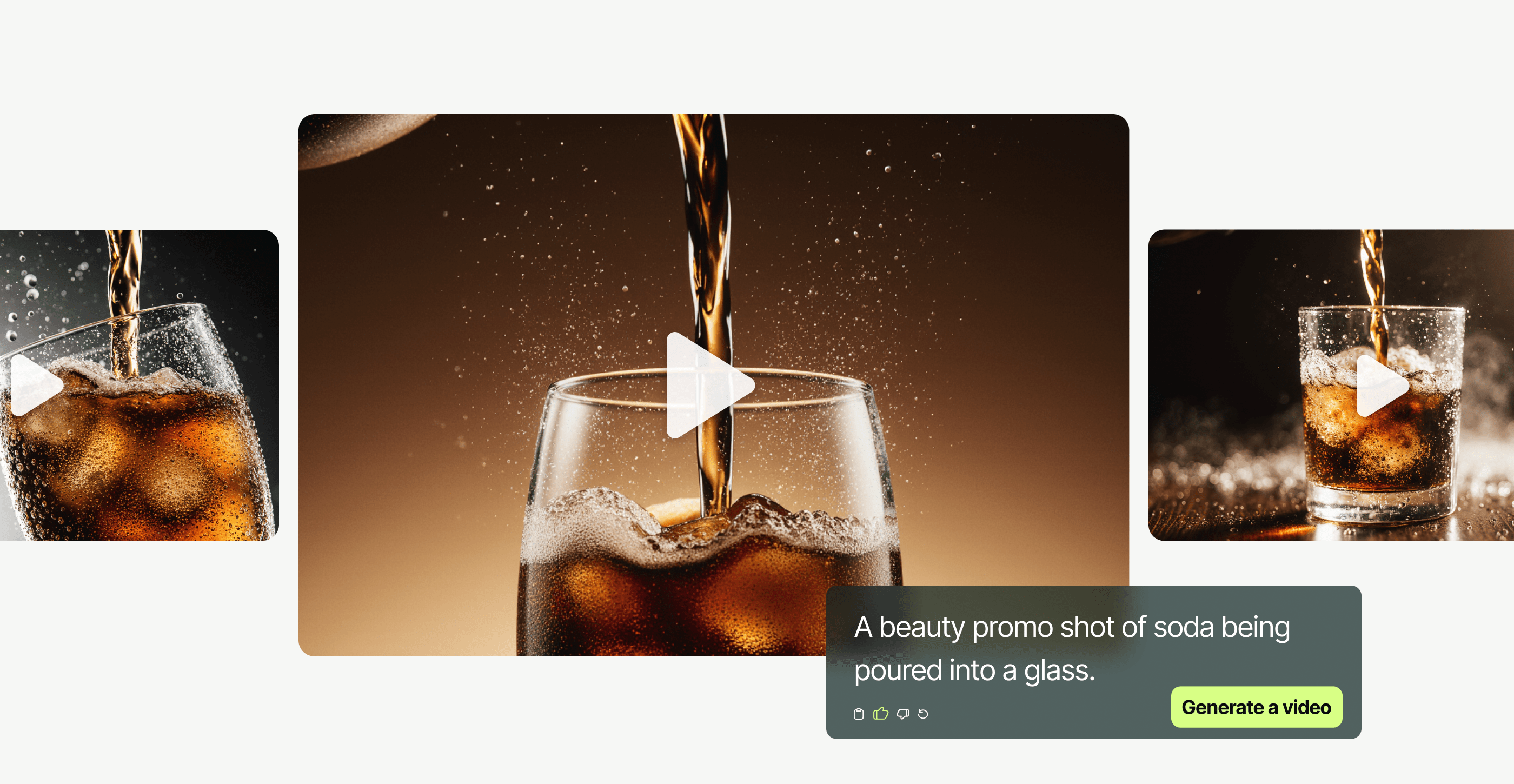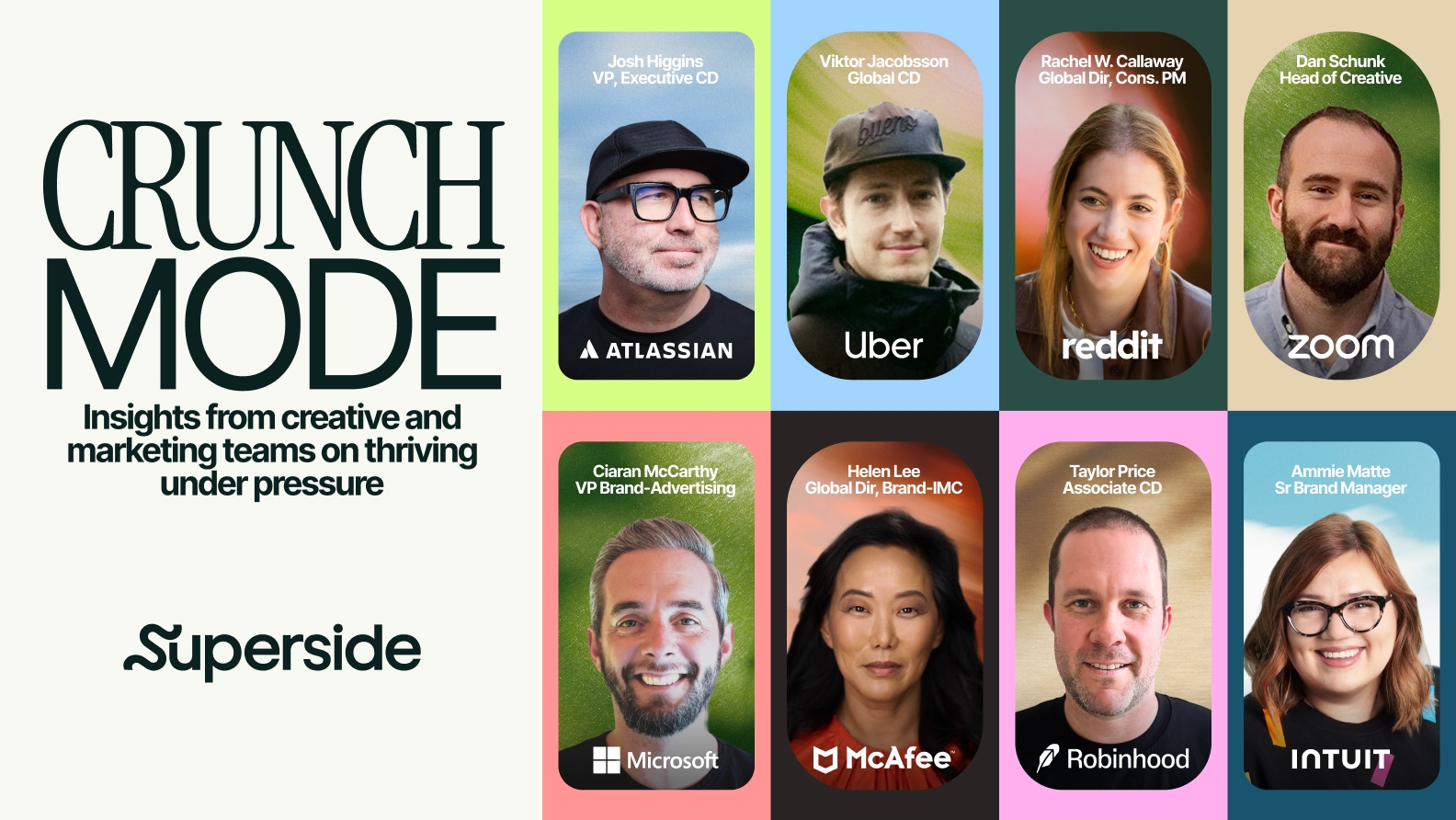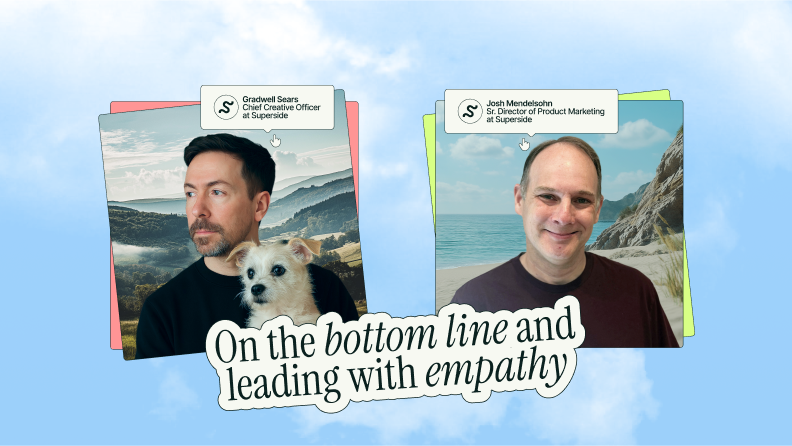Why Superside Invests in Video (and Why You Should Too!)

I almost feel awkward talking about this in a B2B marketing context, but here it goes–our marketing team is highly invested in video.
You read that right: We've invested a ton in a traditionally money-and-effort-suck initiative, with no proof of concept or tangible results to show yet. Oof! What are we thinking, right? And I don't just mean casual videos for Tik Tok. I’m talking serious, high-concept stuff for all sorts of channels and playbooks, including:
- Video for paid acquisition on Facebook and Instagram
- YouTube strategy and support for our organic search playbook
- Video for social (IG reels, TikTok, Linkedin) including tons of UGC-style "live" stuff
- Video to make long-form content like eBooks, guides or support articles more lively and interactive
It’s a big, expensive lift with no historical promise of payback. Why, for the sake of all that is holy, are we investing in video right now?
Video Marketing Grabs Attention, Keeps it There
Let’s unpack our definition of “success” in video marketing: Historically, there isn’t one. We’re in largely uncharted territory, and the definitive value of an effort this size won’t be studiable en-masse for a few more years. So, what figures have prompted this investment, if not ones with dollar signs before them?
Organic search
- 87% increase in video views from Google SERPs
- 300% increase in clicks on content with video
- 63% of our 2022 videos are appearing on the first page of Google Search Results
- Over 31k organic video views on YouTube this year
We started testing with video in late 2020 using UGC style mixed with animations and, later on, bigger video productions. Video for performance marketing has almost always outperformed pure animation and static carousel ads.
Performance marketing
- By adding a human face and narration to an already well-performing ad promoting an ebook, we improved our CTR by 48% and dropped CPC by 62%
- Ads with video have converted at a 30% higher rate to demo request (our typical direct response CTA) when compared to animation-only ads or static ads
- We’ve generated 2500+ demo requests with video since late 2020, with millions of dollars in our pipeline
Asking for the ROI of video marketing at this stage is like asking where the sky begins. We can’t quite say, but we’re damn sure from the sunshine and birds singing that it’s there.
Organic social & e-mail marketing
When it comes to the video content that we invest in across our social channels, we focus largely in 2 areas:
- Original video content (as seen on our TikTok, and made for social videos aligned with gated assets - Designers Read Bad Feedback)
- Promotional/repurposed video content from our Gather and Grow webinar series, Summits, and YouTube videos
Since investing in video we have seen an increase in engagement across our social channels of 26% and average of 9,000 views a month & growing
Account-based marketing
Our marketing videos help us build awareness of Superside across the full buyer committee, sharing video content at all stages of the funnel.
By leveraging video (and Vidyard!) in our sales outreach, we have seen:
- 8x increase in Click-Through Rates
- 4x increase in Reply Rates
- 50% of New Opportunities driven by video
Modern Marketing Favors Video Content
Since 2020, Google has shown video thumbnails in over 25% of search results. That number is increasing, signaling a growing opportunity and competitive advantage for brands leveraging video.
I won’t lie: Developing and funding a sweeping video marketing plan like this is intimidating. It was for me as well. It’s hard to think about, let alone build a plan and get started. I promise you though–it is doable, and it is lucrative.
What You Need for Video Marketing
An effective video marketing strategy requires three key ingredients:
1. A thorough understanding of the various platforms, their formats, and aspect ratios—with an overall content/media strategy that adheres to it strictly.
2. A culture of thinking about video across most of your content marketing and paid media efforts. Make it an involuntary function, like breathing and scrolling. And, most importantly…
3. A dedicated, high-performance video marketing team to develop a winning strategy, imbue novelty and creativity into each asset, and make your voice as loud as it is undeniable.
Make Video Marketing a Top Priority, and Do it Soon
Infusing video in all of our marketing initiatives has helped improve results across the full funnel, from organic search to performance marketing; from socials and emails to ABM. The numbers don’t lie. Video is where modern B2B marketers should plant their flag.
We just wrapped our H2 planning and we've agreed to continue to heavily invest time, effort, brain matter and budget in these efforts. We’re discovering video as a great way to stand out from the crowd, atomize big thoughts and improve the performance of your content.
If these numbers intrigue you — and as a marketer, they should — let’s talk video. Together, we’ll shape your reach to match your grasp.
Amrita is a veteran B2B SaaS marketer and the VP of Marketing at Superside. Besides preaching to everyone and their mother about how good execution is the ultimate differentiator for your company, she hosts our monthly Gather & Grow series featuring leaders from Adobe, Dropbox, HubSpot, Intuit, Shopify and more. Find her on LinkedIn and Twitter and say hi!
You may also like these

7 corporate video production services for businesses (& examples)
Still leaning on static images and text to win customers? Then it’s time for a strategic upgrade.Short-form video has become the most leveraged media format among marketers, and 52% of B2B brands report that video yields the highest ROI. Why? Because videos grab attention, are easy to consume and build deeper connections with target audiences.But video production can be resource-intensive, which may leave you wondering: Should we build an in-house video team, hire freelance video producers or find a reliable video production company to help us out?In this article, we’ll show you what successful corporate video production looks like in the marketing pipeline and why good analytics matter, with insights from Alejandra Medina, Senior Video Producer at Superside.Of course, if you’re ready to scale your enterprise’s video production without delay, look no further than Superside. We offer post-production and end-to-end video services for everything from explainer videos to video ads, thought leadership content and more. And with a proven ROI of 94%, a subscription with us quickly pays for itself.
Don’t ask if you should use AI in video production–ask where
The smartest brands no longer ask whether to use AI in video production. They pinpoint where it fits, what it accelerates and when it truly adds creative value.This shift from “if” to “where” marks a fundamental change for enterprise creative teams. AI video tools have exploded in quality and accessibility. But while the tech barrier has been lowered, the strategic questions have become more complex.Most enterprise marketing leaders find themselves caught between two extremes: The hype that promises AI will replace entire production teams, and the skepticism that dismisses the tech as expensive experimentation. The reality sits somewhere in between, and is far more nuanced than either camp suggests.Here at Superside, we’ve seen firsthand how AI can reduce timelines from weeks to days, generate countless variations from a single concept, and make previously unaffordable creative styles accessible.But we also recognize that video production requires a delicate balance of technical capability and human creative direction to effectively serve business goals.
From projects to programs: Building scalable, strategic video programs
In an era where video is one of the most powerful tools in a marketer’s arsenal, too many teams still treat it like a one-off deliverable. They respond to scattered requests, chase vanity metrics and end up stuck in a cycle of reactive production. But what if video could do more—much more?Andrei Vexler, Senior Director of Video Marketing at Kaseya, focused on this topic during Superside’s Insider Summit. Vexler drew on decades of experience across agency and in-house roles to show how a video strategy can evolve from a cost center to a growth engine. Through stories, frameworks and tactical advice, he outlined a model where video becomes a scalable, strategic function deeply tied to business outcomes.What follows are the key insights and lessons from his session—ideal for creative leaders, marketing strategists and anyone tired of chasing views without seeing results.Creative teams are not just service providers—they’re growth driversOne of the central themes of Vexler’s talk was a direct challenge to the traditional, transactional role of creative teams in marketing organizations. Too often, creative teams fall into reactive “order-taking” roles, fielding ad-hoc video requests without understanding—or owning—the business impact.








